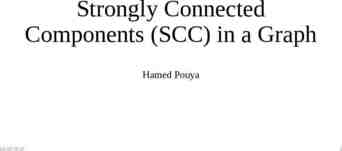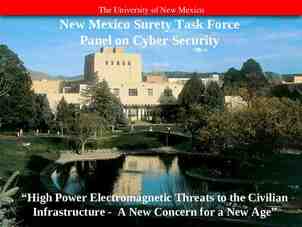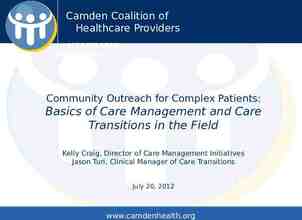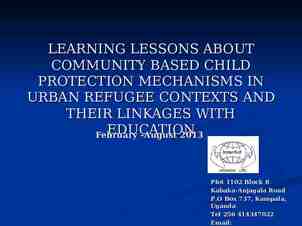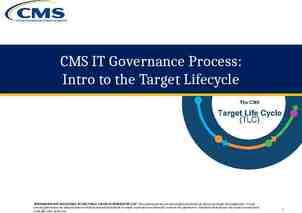NAVIGATING NIH PROGRAMS TO ADVANCE YOUR CAREER AT NIH Ericka Boone,
42 Slides8.82 MB

NAVIGATING NIH PROGRAMS TO ADVANCE YOUR CAREER AT NIH Ericka Boone, Ph.D. Acting Director, Division of Biomedical Research Workforce Office of the Director, Office of Extramural Research National Institutes of Health

Who Are We? The NIH! 2

FY 2020 Operating Budget: 40B Chart Title Training: 886,806 Career: 844,348 Total: 1,731,154 Research Mgmt & Support: 5.0% 3 NIH Budget Office: http://officeofbudget.od.nih.gov/index.htm

NIH includes 27 Institutes & Centers Office of Extramural Research Division of Biomedical Research Workforce (DBRW) Office for Scientific Workforce Diversity Office Office of of the the Director Director Office Intramural Training and Education National National Institute Institute on on Aging Aging National National Institute Institute on on Alcohol Alcohol Abuse Abuse and and Alcoholism Alcoholism National National Institute Institute of of Allergy Allergy and and Infectious Infectious Diseases Diseases National National Institute Institute of of Arthritis Arthritis and and Musculoskeletal Musculoskeletal and and Skin Skin Diseases Diseases National National Cancer Cancer Institute Institute National National Institute Institute of of Child Child Health Health and and Human Human Development Development National National Institute Institute on on Deafness Deafness and and Other Other Communication Communication Disorders Disorders National National Institute Institute of of Dental Dental and and Craniofacial Craniofacial Research Research National National Institute Institute of of Diabetes Diabetes and and Digestive Digestive and and Kidney Kidney Diseases Diseases National National Institute Institute on on Drug Drug Abuse Abuse National National Institute Institute of of Environmental Environmental Health Health Sciences Sciences National National Eye Eye Institute Institute National National Institute Institute of of General General Medical Medical Sciences Sciences National National Heart, Heart, Lung, Lung, and and Blood Blood Institute Institute National National Human Human Genome Genome Research Research Institute Institute National National Institute Institute of of Mental Mental Health Health National National Institute Institute of of Neurological Neurological Disorders Disorders and and Stroke Stroke National National Institute Institute of of Nursing Nursing Research Research National National Center Center for for Complementary Complementary and and Integrative Integrative Health Health Fogarty Fogarty International International Center Center National National Center Center for for Advancing Advancing Translational Translational Sciences Sciences National National Library Library of of Medicine Medicine Clinical Clinical Center Center Center Center for for Information Information Technology Technology National National Institute Institute on on National Institute Institute of of National Minority Health Biomedical Imaging Minority Health and and Biomedical Imaging Health and Health Disparities Disparities and Bioengineering Bioengineering Center Center for for Scientific Scientific Review Review 4

ONE NIH, 27 Cultures Each IC has its own mission Each IC has its own budget Each IC has its own activities Each IC has its own way of doing business So, how do you figure out WHERE to start? Here’s some advice! 5

Interacting with NIH NIH Staff Program Officer Scientific Review Officer Scientist & Administrator Scientist & Administrator Identifies areas of scientific need Manages grant reviews Communicates NIH priorities to investigators and others Appoints members to review groups & panels Manages grants Prepares summary statements Communicates with IC Leadership about the science Grants Management Officer Implements the funding process Oversees the budget Ensures grantee compliance with NIH policies & regulations

Who Should I talk to? When? And About What? NIH People Program Officer Before applying discuss o Concept paper aims & fit with NIH priorities o Appropriate funding mechanism o Responsiveness to review criteria o After Review to discuss next steps Scientific Review Officer After application is assigned to a review committee until review is complete to discuss: o Review committee selection o Missing info o Supplemental info Grants Management Officer Before or after review to discuss: o NIH grants policy o Budget o Change of institutions o Grant start dates

Use These Resources to Find the Right IC and PO Talk to mentors and colleagues Search NIH RePORTER for funded projects Search NIH MATCHMAKER for similar projects and their POs Review IC missions, strategic plans, & research priorities Review IC division or program webpages

Normalize the ‘Reaching Out’ Contact POs via email - WELL BEFORE YOUR DEADLINE No dissertations, please – Include a 1-2 Page concept – Research Project Grants (RPG) Include brief background, significance of the problem or question being addressed and specific aims – Training (e.g., F30, R36, F31, F32) and Career Development Grants (e.g., K01, K08, K23) Brief background, significance of the problem or question the project will address, specific aims; training goals; mentoring team and their current funding and a CV or NIH Biosketch Follow-up as needed – email piles are deep

Additional Advice for Navigating NIH Programs Review IC priorities and goals (they can differ by IC and programs) Learn the NIH application & review process Make early contact with program officers Find innovative, well-respected mentors & collaborators Study successful grant applications Propose your best and most creative ideas Review funding opportunity announcements (FOAs) o o Grants.gov NIH Guide for Grants and Contracts Dig deeper: - Finding and Understanding 10 FOAs

Types of Funding Opportunity Announcements (FOA) Type of FOA Description Program Announcements (PA, PAR, PAS) Requests for Applications (RFA) Parent Announcements Highlights specific, high-priority areas of scientific focus/interest PAS: PA with set aside funds; PAR: has a special receipt, referral and/or review considerations (described in PA) Usually ongoing (3 years) Often use standard receipt dates (you can control when you apply!) Most (but not all) NIH ICs participate Identifies specific scientific areas, amt of set-aside funds, anticipated # of awards Usually, single receipt date IC usually convenes review panel Broad FOAs allowing applicants to submit “investigator initiated” or “unsolicited” research ideas to a specific activity code (e.g., R01, R03) Most apps to NIH investigator initiated Usually ongoing (3 years); standard receipt dates (you have flexibility)

NIH Research Training Website https://researchtraining.nih.gov 12

Funding Options by Career Phase Undergraduate Undergraduate Graduate/ Graduate/ Clinical Clinical Training Training T34, T34, R25 R25 T32, T35 T32, T35 F30, F30, F31 F31 Early Early Research Research Career Career Postdoctoral Postdoctoral Training/Clinical Training/Clinical Residency Residency K01, K01, K07, K07, K25 K25 T32 T32 F32, F32, DP5 DP5 R38, R38, (K38) (K38) R25, R25, K12 K12 K22, K22, K99 K99 K08, K08, K23 K23 K22, K22, R00 R00 Established Established Investigator Investigator R03, R03, R21, R21, DP2 DP2 R01, R35 R01, R35 R01, R01, R35 R35 P01, P50 P01, P50 K02, K02, K24 K24 Loan Loan Repayment Repayment Programs Programs https://www.lrp.nih.gov/ Diversity Diversity Supplements Supplements :: PA-20-166 PA-20-166 Re-Entry Re-Entry Supplements: Supplements: NOT-OD-20-054 NOT-OD-20-054 13

Diversity Supplement * PA-20-166 Administrative supplement to an existing, actively funded research grant designed to: Diversify the biomedical research workforce via support of investigators from diverse & underrepresented groups Support many career stages from undergraduate to faculty Could be a bridge to an F or K award Add to ongoing research and career development Expectation of a subsequent application for NIH support Administratively reviewed by the Institute or Center (IC) funding the original grant Note: different NIH ICs have different deadlines and policies 14

Loan Repayment Program 2-year Research Commitment Up to 50,000/year – renewals eligible 50% Success Rate LRP Resources – www.lrp.nih.gov Extramural LRP Application Deadline November 18, 2021

Predoc and Early Postdoc Training Undergraduate Graduate/ Clinical Training T34,R25 T32, T35 F30, F31 Postdoctoral Training/ Clinical Residency Early Research Career Established Investigator T32 F32 Diversity Supplements: : PA-20-166 Diversity supplements can be useful to support a transition to individual fellowship or beyond 16

Ruth L. Kirschstein NRSA Goal to ensure diverse pool of highly trained scientists in appropriate scientific disciplines, to address the Nation's biomedical, behavioral, & clinical research needs Institutional Training Programs (T32-Series): Awards to an institution to support research training activities for graduate student and/or postdoc trainees selected by the institution Require a program director and experienced faculty to serve as mentors Individual Fellowships (F-Series)-require primary sponsor: Awards for combined clinical and research doctoral degree training (F30) Awards for graduate students working towards research doctoral degree (F31 & F31D) Awards for postdoctoral fellows working towards research independence (F32) As well as primary sponsor, a mentoring team is highly recommended 17

Common Features of NRSAs FY21 NRSA Tuition, Stipend and TRE/IA Levels Trainees & Fellows are required to pursue full-time research training (40 hrs/week) Stipends: Allowance to defray living expenses: Stipends increased each year since 2017 Tuition and Fees: NIH contributes to the combined cost of tuition and fees Institutional Allowance (F) or Training Related Expenses (T): Defray expenses such as health insurance, research supplies, equipment, books, travel to scientific meetings: Increased each year (postdocs) to better support costs of medical expenses NRSA trainees or fellows may gain clinical trials research experience but cannot lead an independent clinical trial. F-Kiosk: https://researchtraining.nih.gov/programs/fellowships T-Kiosk: https://researchtraining.nih.gov/programs/training-grants 18

Institutional NRSA: Predoctoral T32: Provides a strong foundation in research design, methods, and analytic techniques to enhance the trainees’ ability to conceptualize pursue a research project with increasing independence T35: Short-term training programs to expose medical/clinical students to research and encourage them to pursue research careers Individual NRSA: Predoctoral and Postdoctoral F30: Supports predoc fellows during clinical and graduate training leading to a combined doctoral degree, e.g., MD/PhD, DDS/PhD (PA-21-050) F31: Supports promising research doctoral candidates who have identified a mentor and will be performing dissertation research (PA-21-051) Diversity F31: supports individuals from groups underrepresented in the biomedical or behavioral sciences (PA-21-052) F32: Supports highly promising applicants during their mentored postdoctoral training under the guidance of outstanding faculty sponsors (PA-21-048) Training grants are restricted to domestic (U.S.) institutions; Trainees must be citizens, non-citizen nationals, or lawfully admitted for permanent residence by the time of appointment 19

NIH Director's Early Independence Award (DP5) Graduate/ Clinical Training Postdoctoral Training/ Clinical Residency DP5 Skip Postdoctoral Period Early Research Career Established Investigator DP5 DP5: High-risk, high-reward program supporting exceptional investigators to pursue independent research directly after completion of their research doctoral degree or clinical residency Bypasses traditional post-doctoral training and accelerates entry into an independent research career Applicants must be within 12 months before or after receiving a research doctoral degree or completing clinical postgraduate training Awardees are expected to be competitive for continued funding of her/his research program and for a permanent research position Funded via Common Fund 20

Career Development and Other Early Career Awards Graduate/ Clinical Training Early Research Career Postdoctoral Training/ Clinical Residency K01, K07, K25 K12, KL2 K22, K99 K08, K23 K12, KL2 Established Investigator R03, R03, R21, R21, DP2 DP2 K22, R00 Loan Loan Repayment Repayment Programs Programs Diversity Diversity Supplements Supplements :: PA-20-166 PA-20-166 Re-Entry Re-Entry Supplements: Supplements: NOT-OD-20-054 NOT-OD-20-054 21

Early-Stage Investigators Definition of Early-Stage Investigator (ESI): A PD/PI who has completed their terminal research degree or end of post-graduate clinical training, whichever date is later, within the past 10 years and who has not previously competed successfully as PD/PI for a substantial NIH independent research award. Following is a list of NIH grants that a PD/PI can hold and still be considered an ESI: Research Grants: R00, R03, R15, R21, R25, R90, RL9, RL5, R34, R36, R41, UT1, R43, U43, R55, R56, SC2, SC3, X01 Training-Related and Mentored Career Awards: “F”, “K”, L30, L32, L40, L50, L60, T32, T34, T35, T90, D43 Instrumentation, Construction, Education, Health Disparity Endowment Grants, or Meeting Awards: G07, G08, G11, G13, G20, R13, S10, S15, S21, S22 22

ESI Status Has Its Benefits Funding o NIH sets funding target ESIs and prioritizes R01 applications with meritorious scores for funding (i.e., attempt to create greater parity in success rates among early-stage and established investigators) Peer Review o Peer reviewers look more at potential than advanced track record Weigh academic and research background Expect new R01 investigators to have fewer preliminary data/publications than more established researchers o When feasible, early-stage investigator applications are not interspersed with those of established investigators at the review meeting 23

Common Features of K-Awards Intended for investigators at earlier phases of their research career Provide salary and mentored research support for up to 5 years of protected time under the guidance of an experienced mentor By the time of award/appointment, candidates must be citizens, U.S. nationals, or lawfully admitted for permanent residence in the U.S. (Except for the K99-R00) Awardees/appointees must have a research or clinical doctoral degree from an accredited domestic (U.S.) or foreign institution Awardees or appointees must have a full-time appointment at the institution, and must commit a minimum of 9 person-months (75% of full-time professional effort) to research career development Former PD/PIs on major NIH research grants (e.g.R01), other career development awards (i.e., K–awards), or the equivalent are not eligible K-Kiosk: https://researchtraining.nih.gov/programs/career-development 24

Career (K) Kiosk Active FOAs (Parent & IC specific) can be fou nd at: https://researchtraining.nih.gov/progr ams/ career-development At that website click on each K award type to view active FOAs https://researchtraining.nih.gov/programs/fellowships 25

K01, K08 and K23 FOAs with different requirements Funding Opportunity Announcements (FOAs) for K Awards will : Require PD/PI to conduct an independent clinical trial PA-20-176 (K01;14 IC) PA-20-202 (K08;15 IC) PA-20-206 (K23;17 IC) K applicant/awardee has primary or lead responsibility for conducting & executing the trial (Funding is from the K award & may be an ancillary or feasibility study) Permit clinical trial research exp erience but will NOT permit an independent clinical trial PA-20-190 (K01;16 IC) PA-20-203 (K08; 20 IC) PA-20-205 (K23; 19 IC) K applicant/awardee may propose research experience in a clinical trial led by the K award mentor or comentor. Permit Basic Experimental Studies with Humans (BESH) PA-20-191 (K01; 9 IC) PA-20-201 (K08; 13 IC) PA-20-204 (K23; 12 IC) K applicant/awardee may propose basic science experimental studies involving humans which can be “prospective basic science studies involving human participants.” 26

Institutional Mentored K-Awards K12/KL2: Institutional program to support highly promising candidates (scholars) training for careers in specified research areas of interest to one or more NIH Institutes and Centers (IC) IC specific (e.g., some K12/KL2 for clinicians or clinically relevant research) Some for PhD (e.g., IRACDA program with combined research & teaching involving partnerships with research intensive institutions and institutions with an emphasis on undergraduates or graduates from under-represented groups) Provides institutions with flexibility to prepare clinically-trained scientists or PhDs for independent research careers or academic careers at multiple institution types Requires experienced program director with research and administrative experience, and highly competent faculty mentors Individualized and intensive supervised research experiences and career development guidance for scholars selected by the grantee institution Encouragement/expectation to apply for either individual K award, e.g., K08, K23, K01 – or research project grants (R03/R21/foundation/R01) 27

Pathway to Independence Award Mentored Scientists Awards (K99/R00) K99/R00: Goal to facilitate transition from a mentored postdoctoral research position to an independent research position with independent NIH research support at an earlier stage than the current norm Supports protected time (75%) in 2 distinct phases – update FOA #s below: K99 – Phase 1- 2 years Mentored: must be affiliated with an institution Within 4 years of attaining PhD or completing clinical training 90% transition to R00. R00 – Phase 2 (3 years) Independent (tenure-track or equivalent),own lab limited teaching and/or clinical responsibilities to assist pathway to next independent award. ‘Quality’ of tenure-track offer administratively reviewed by NIH staff before R00 awarded No U.S. citizenship requirement for applicants to the parent K99 (PAR-21-271) NIDCR Dual Degree Dentist Scientist K99-R00 (PAR-18-432; PAR-19-144; PAR-19-141) no U.S. citizenship requirement. Brain Research through Advancing Innovative Neurotechnologies (BRAIN) Initiative K99-R00 to promote diversity ( RFA-NS-19-043 RFA-NS-19-044) requires citizenship/permanent resident status. Maximizing Opportunities for Scientific and Academic Independent Careers (MOSAIC) Postdoctoral Career Transition Award to Promote Diversity K99-R00 requires citizenship/permanent resident status; first due date February 12th 2020 (PAR-21-271); Institutional UE5 Co-operative Agreement (PAR-21-277) provides courses for skills development & mentoring. Due to COVID two cycle extension of eligibility announced for Parent K99 NOT-OD-21-106; NIDCR K99 NOT-DE-21-003; Mosaic K99 NOT-GM-21-057 28

Maximizing Opportunities for Scientific & Academic Independent Careers (MOSAIC) Transition Award to Promote Diversity - Program Goal MOSAIC is designed to facilitate the transition of promising postdoctoral researchers from diverse backgrounds, for example individuals from groups underrepresented in the biomedical research workforce at the faculty level, into independent, research-intensive faculty careers The overarching goal of the NIH MOSAIC program is to enhance the diversity of independent investigators conducting research within the NIH mission. Program priority is to address documented underrepresentation at the faculty level (e.g., see NIH’s Notice of Interest in Diversity). 29

MOSAIC - Approach Postdoctoral Career Transition Award to Promote Diversity (K99/R00) – PAR-21-271, -272, and -273 Institutionally Focused Research Education Cooperative Agreement to Promote Diversity (UE5) – PAR-21-277 MOSAIC K99/R00 Applicants MOSAIC K99/R00 Scholars Participate in Cohorts Organized by UE5 30

Timeline for (new) K Applications RECEIPT DATE REVIEW COUNCIL AWARD DATE Feb 12 (Mar 12) Jun/July October December Jun 12 (Jul 12) Oct/Nov January April Oct 12 (Nov 12) Feb/Mar May July https:////grants.nih.gov/grants/how-to-apply-a pplication-guide/due-dates-and-submission-po licies/due-dates.htm 31

Academic Research Enhancement Award Small Grant Program R03: Provides limited funding for a short period of time to support a variety of types of projects, including: Pilot or feasibility studies Collection of preliminary data Secondary analysis of existing data Small, self-contained research projects Development of new technology, etc. Limited to two years of funding, and grants are not renewable R15: Supports small-scale research projects conducted by faculty and students at educational institutions that have not been recipients of major NIH research grant funds The goals of the program are to: (a) support meritorious research; (b) expose students to research; and (c) strengthen the research environment of the institution The project period is limited to 3 years, and grants are renewable While preliminary data are not required, it may be provided as appropriate Direct costs are limited to 300,000 over the entire project period Direct costs generally up to 50,000 per year Check FOAs to see which ICs participate PA-20-200 32

Exploratory/Developmental Research Award R21: Encourages new, exploratory and developmental research projects by providing support for the early stages of project development Sometimes used for pilot and feasibility studies Preliminary data are not required but may be included if available Limited to up to two years of funding Combined budget for direct costs for the twoyear project period usually may not exceed 275,000 Not all Institutes/Centers participate in this program PA-20-195 PA-20-194 PA-20-196 NIH Director’s New Innovator Award DP2: Supports exceptionally creative early career investigators who propose innovative, high-impact projects in the biomedical, behavioral or social sciences within the NIH mission. No detailed experimental plan or preliminary data are required Work proposed ‘high risk, high reward’ – more innovative than outside the standard R01 Awardees are required to commit at least 25% of their research effort each year to activities supported by the New Innovator Award Awards are up to 300,000 in direct costs each year for 5 years, plus applicable indirect costs Complements ongoing efforts by NIH to fund early-stage investigators through R01 grants Funded through the Common Fund RFA-RM-20-012 33

Maximizing Investigators Research Award (MIRA) for Early-Stage Investigators (R35) Katz Award (R01) Goals: Goals: PD/PI must be designated as an ESI Proposed research can rely on the prior work and expertise as foundation, but must represent a different direction (not just incremental expansion) Change in direction can involve a new approach, methodology, technique, discipline, therapeutic target, paradigm Make sure you talk to your PO prior application (be sure to get the deets!) New program! First awards announced December 2021 Can request up to 500K/year in direct costs Enable ESIs to apply earlier in their independent research careers Secure funding to launch & sustain successful research careers. Enhance ability to move into research areas distinct from their postdoctoral mentors, which could lead to new scientific discoveries. Reduce time writing and reviewing grant applications & allow more time to conduct research. Enable investigators to mentor trainees in a more stable research environment. PAR-20-117 PAR-21-038 34

Research Project Grant R01 Supports a discrete, specified, circumscribed project in areas representing the specific interests and competencies of the investigator(s) Proposed project must be related to the programmatic interests of one or more of the participating Institutes and Centers based on their scientific missions Most NIH Institutes and Centers support the R01 grant mechanism Typically provides funding support for up to 5 years Modular budget format allows you to request up to 250,000 per year in direct costs; traditionally capped at 500,000 per year Successful R01 grant application requires preliminary data to support proposed research 35

Wrapping Up Additional Helpful Information 5/12/24 36

NIH Issues Important Policy Updates via Notices (NOT) NOT-OD-21-073 - Upcoming Changes to the Biographical Sketch and Other Support Format Page for Due Dates on or after May 25, 2021 NOT-OD-21-109 - Expanding Requirement for eRA Commons IDs to All Senior/Key Personnel NOT-OD-21-110 - Implementation of Changes to the Biographical Sketch and Other Support Format Page NOT-OD-21-122 - Announcing New Inbox for Inquiries Related to Changes to Biographical Sketch and Other Support Format Page NOT-OD-21-170 - Updates: Notification of Upcoming Change in Federal-wide Unique Entity Identifier Requirements NOT-OD-19-109 - ORCID iD Requirement for Trainees, Fellows & Career Development (K) Appointees or Awardees: 37

Grants.gov Search Grants.gov for funding opportunities from all agencies. 38 38

Grants and Funding – Grants.nih.gov http://grants.nih.gov/grants/oer.htm 39

Subscribe to Receive the Weekly NIH Guide Table of Contents NIH Guide is published daily. Subscribe to listserv to receive table of contents each Friday or subscribe to our RSS feed or follow us on Twitter http://grants.nih.gov/grants/guide/listserv dev.htm 5/12/24 40

Extramural Nexus and Open MikeBlog Subscribe to the monthly Nexus for a summary of NIH grant happenings, resources, events. http://nexus.od.nih.gov Provide comment, join the discussion! 41

Thank You! Division of Biomedical Research Workforce Office of Extramural Research Research Training/Career Development Questions: https://researchtraining.nih.gov Questions about ESI extension requests: esi [email protected] ESI Policies, FAQs Podcasts https://grants.nih.gov/policy/early-stage/index.htm 42

